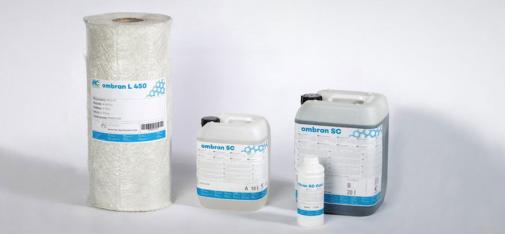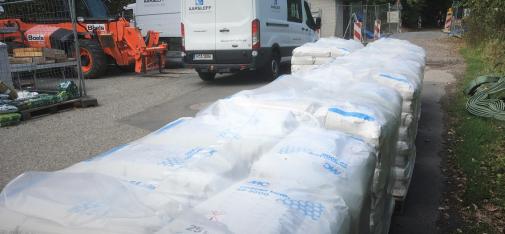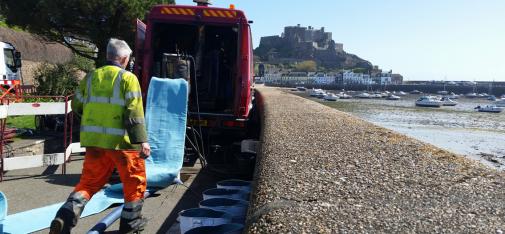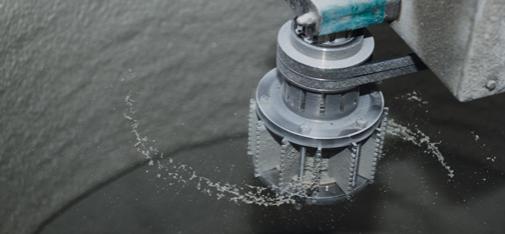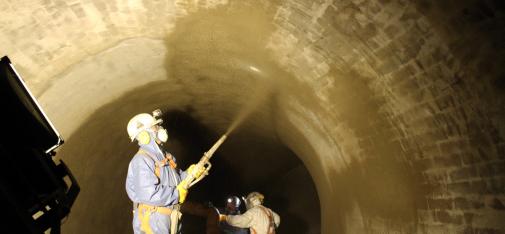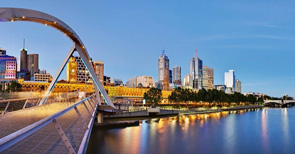-

Rehabilitation of a rainwater collector
At Düsseldorf Airport, a large-profile rainwater collector had to be rehabilitated below two take-off and landing runways, a project in which MC-Bauchemie's ombran MHP-SP concrete-protective coating played a key role.
Rainwater collector rehabilitated at Duesseldorf airport
Düsseldorf - Deutschland
At Düsseldorf Airport, a large-profile rainwater collector had to be rehabilitated below two take-off and landing runways, a project in which MC-Bauchemie's ombran MHP-SP concrete-protective coating played a key role.
The rehabilitation of a rainwater harvesting facility at Germany's third-largest airport in Düsseldorf is part of a comprehensive refurbishment strategy being implemented to make the airport's wastewater network, which covers a good 120 kilometres, fit for its future capacity requirements. The airport's Real Estate Management division commissioned ISAS GmbH (engineers for the rehabilitation of wastewater systems) from Füssen (Germany) with the project planning. As part of the solution, the decision was taken to use ombran MHP-SP, MC's concrete-protective mineral coating in combination with the installation of stainless steel inner sleeves. The contractor chosen to carry out the work was the Cologne/Bonn branch of Aarsleff Rohrsanierung GmbH.
Large storage sewer from the 1960s
The almost one kilometre long rainwater collector referred to as “Mitte” (central), which passes under both the north and south runways and the "Mike" taxiway, was completed in the 1960s. Its purpose is that of a storage sewer designed to channel the precipitation from large parts of the paved areas of the apron, taxiways, take-off and landing runways and terminal roofs to the central rainwater treatment plant. In the winter months, the inflow also includes water contaminated with aircraft de-icing agent.
Aligned to the defined rehabilitation goal, namely of sustainably securing both the structural load-bearing capacity and the impermeability of the sewer, various repair and refurbishment techniques were applied. Below the trafficked areas where the residual structural safety margins were to be increased for future loads, GRP pipes from the company Amiblu were installed in the old sewer as a tight-in-pipe single-pipe lining over a length of approximately 365 metres. Meanwhile, in the areas between and outside the trafficked areas a concrete-protective mineral coating of ombran MHP-SP from MC-Bauchemie – 40 tonnes in total – was applied to the inside walls. This coating was combined with 45 stainless steel inner sleeves that serve to ensure total tightness across the pipe joints.

© MC-Bauchemie 2025
Rehabilitation without flight disruption
The refurbishment project began in summer 2019. The biggest challenge lay in meeting the number-one priority that flight operations should not be affected in any way. This meant that work was consistently carried out from midnight only, with two crews operating in parallel and with the construction site having to be completely covered and cleared again by 5 in the morning. While one crew installed the tight-in-pipe pipe sections in the rainwater collector, a second team at a different location renovated the inner surfaces using the ombran coating systems from MC-Bauchemie. The collector substrate was first prepared to the required standard using ultra-high pressure water jets. Exposed reinforcing bars were then coated with the corrosion inhibitor Nafufill KMH to ensure permanent protection. Subsequently, the single-component reprofiling and coating mortar ombran MHP-SP – a product with full German building authority approval – was used in combination with the bonding agent ombran HB. Offering exceptional pumpability, the cement-bound, polymer-modified and fibre-reinforced special mortar was conveyed to the point of use by a screw pump and then manually installed from the "open" hose end. The coating was applied up to heights of between 1.4 and 2.5 metres, depending on the damage and the size of the profile in the base area. Then the stainless steel inner sleeves were fitted across the pipe joints to seal them.
The coating work inside the collector was accompanied by rehabilitation also of the access manholes. The damaged masonry berms were re-concreted, the ladder assemblies were renewed and the manholes were also coated with the highly sulphate-resistant mortar for coating and reprofiling in sewage systems ombran MHP .
Highly specialised projects such as this can only be carried out successfully with good and reliable partners constantly and effectively consulting with one another. And that was the case in Düsseldorf: Despite the immense logistical challenge, the rehabilitation project was successfully completed in early 2020, with the client fully satisfied at both its management and the final outcome. All planned processes proceeded flawlessly as predicted, with not a single flight delayed.
-
Name
Rainwater collector rehabilitated at Duesseldorf airport
-
Country
Düsseldorf - Deutschland, 2020
-
Categories
-
Products
ombran MHP-SP
ombran HB
Nafufill KMH - for underground sewer systems
RELATED CONTENT
-
News
Click here to go to our News section.
-
MC-Pedia
In our MC-Pedia you will find technical articles on various topics written exclusively by our specialists.
-
Magazine
Get our latest issues of our customer and employee magazine MC aktiv.
-
Downloads
Find all relevant datasheets of our products as well as brochures of our company, Fields of Expertise and product categories here.
-
References
Click here to get to our library with reference projects for all types of application.
-
Careers
Click here to go to MC Career.
-
Contact
Click here to go to our Contact section.


